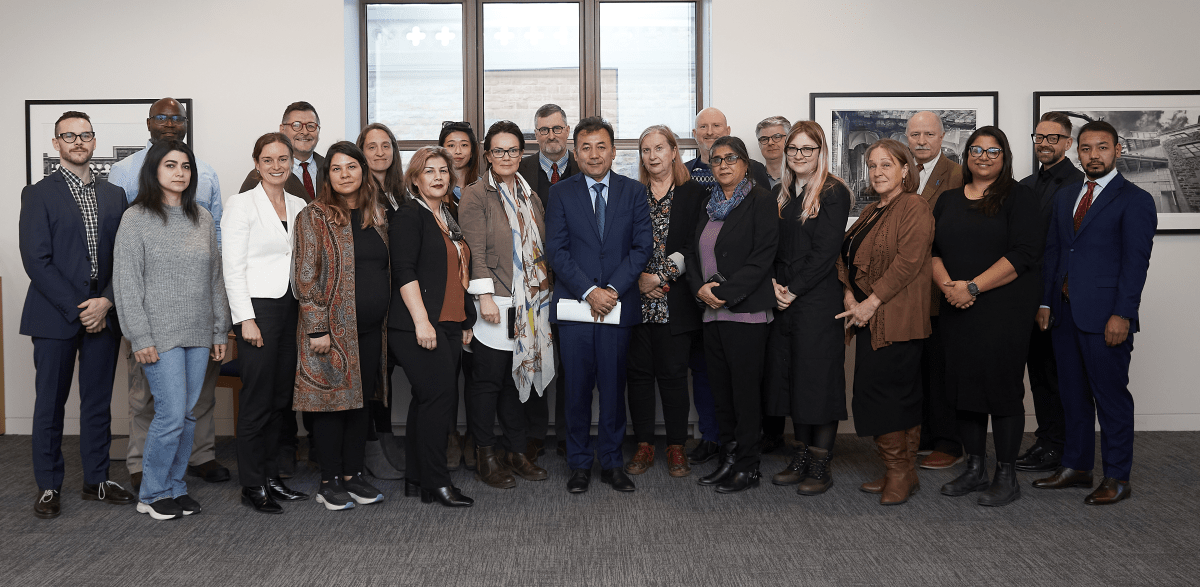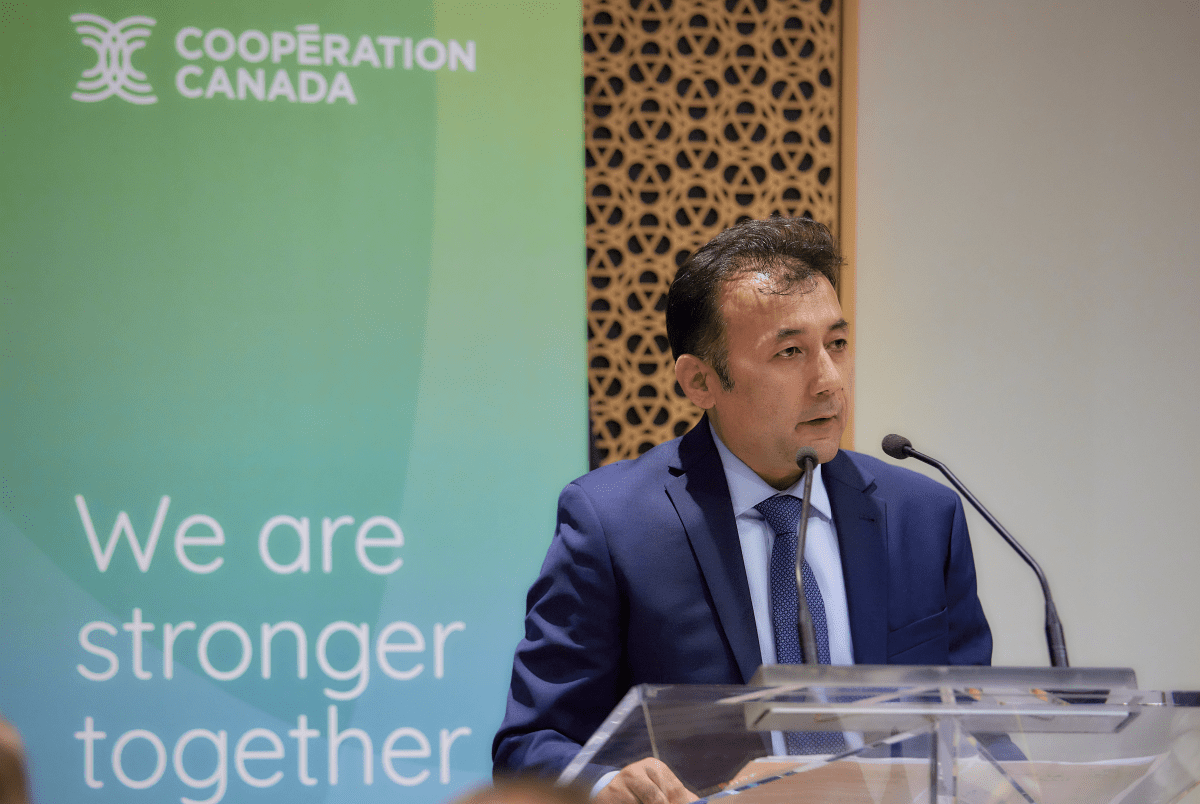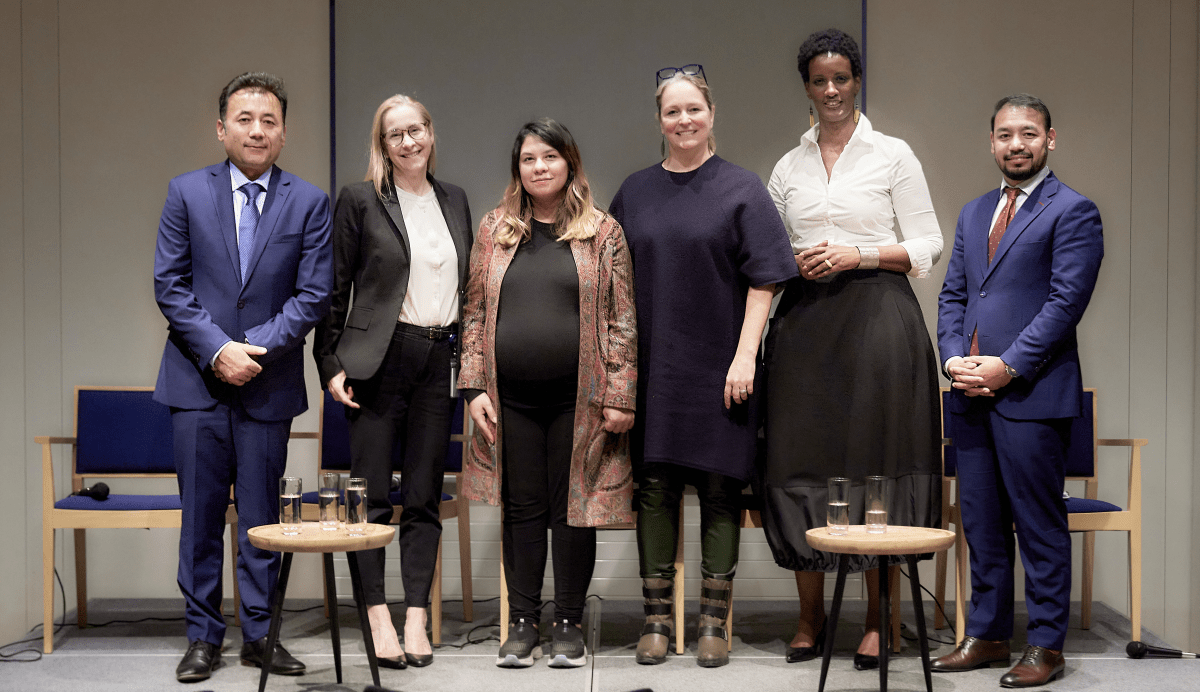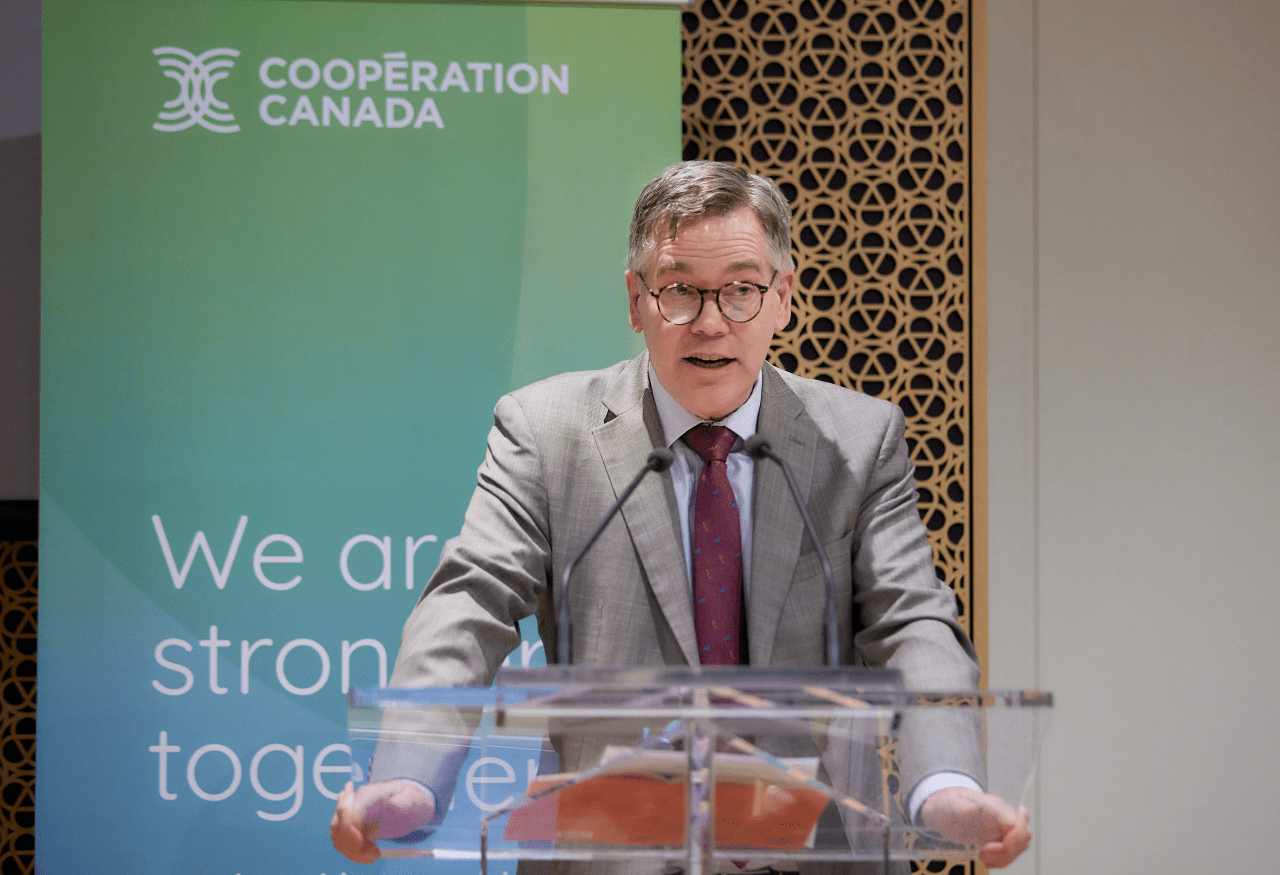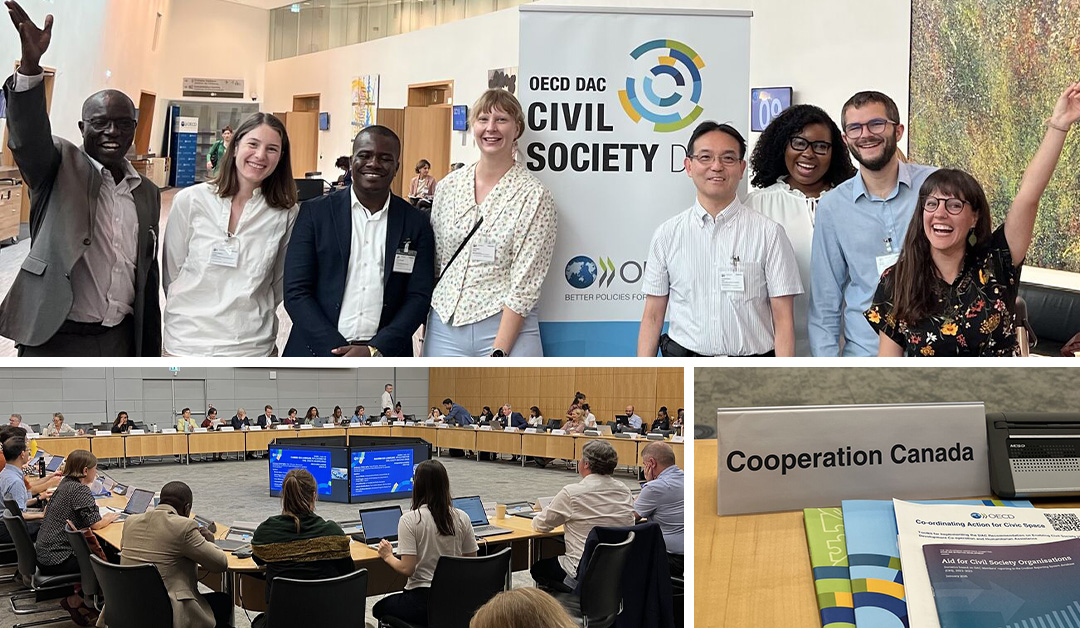
by Cooperation Canada | Jun 25, 2025 | Civic Space, Civil Society, News
In June 2025, Cooperation Canada joined civil society and government actors in Paris for the OECD Development Assistance Committee (DAC) Civil Society Days. As the primary body through which donor countries coordinate development assistance policies, the DAC plays a critical role in shaping how international cooperation supports democracy, rights, and civic engagement globally.
The context could not be more urgent. Around the world, civil society organizations are operating in increasingly hostile environments. Criminalization of advocacy, digital repression through cybercrime laws, internet shutdowns, and the securitization of protest are no longer isolated phenomena. They are becoming systemic features of governance in too many places.
And yet, it is important to acknowledge a critical point raised during discussions: for many communities, civic space has never truly been open. While we often speak of “closing space,” some civil society actors, particularly those representing historically marginalized groups, have always operated on the margins of visibility, legitimacy, and safety. That reality must shape how we design and deliver development cooperation.
In politically constrained environments, donor engagement remains complex. Speakers emphasized the importance of staying present, not disengaging, while adopting flexible, context-sensitive approaches. The forthcoming OECD toolkit on coordinated action for civic space was welcomed as a practical step in that direction.
A key shift in thinking emerged around Locally Led Development (LLD). There was a clear call to move beyond the notion of “capacity building” which too often implies a deficit model, and toward capacity sharing, which values the experience and leadership of local actors. This framing challenges long-standing hierarchies in development and demands a more equitable approach to partnership.
This shift is also linked to how we understand and manage risk. Development actors must reconsider risk not only as a question of fiduciary control or institutional reputation, but as something already deeply embedded in the daily work of civil society, particularly in repressive environments. True solidarity requires donors to take on part of that risk, rather than outsourcing it through overly rigid accountability frameworks.
The session on climate governance brought this to the fore. While adaptation finance has surged since the Paris Agreement, outcomes for the most climate-vulnerable communities remain disappointingly narrow and technocratic. Without meaningful civil society engagement and public trust, adaptation efforts will continue to miss the mark.
Finally, as the DAC prepares to release its five-year implementation report on the 2021 Recommendation on Enabling Civil Society, participants reaffirmed the need to translate donor commitments into consistent, coherent support for civil society. That means funding that is flexible and long-term, mechanisms for accountability that are participatory, and policies that protect, not just tolerate, independent civic actors.
At Cooperation Canada, we continue to champion these principles. Civic space is not a development add-on; it is the very ground on which democratic, inclusive, and accountable development stands.
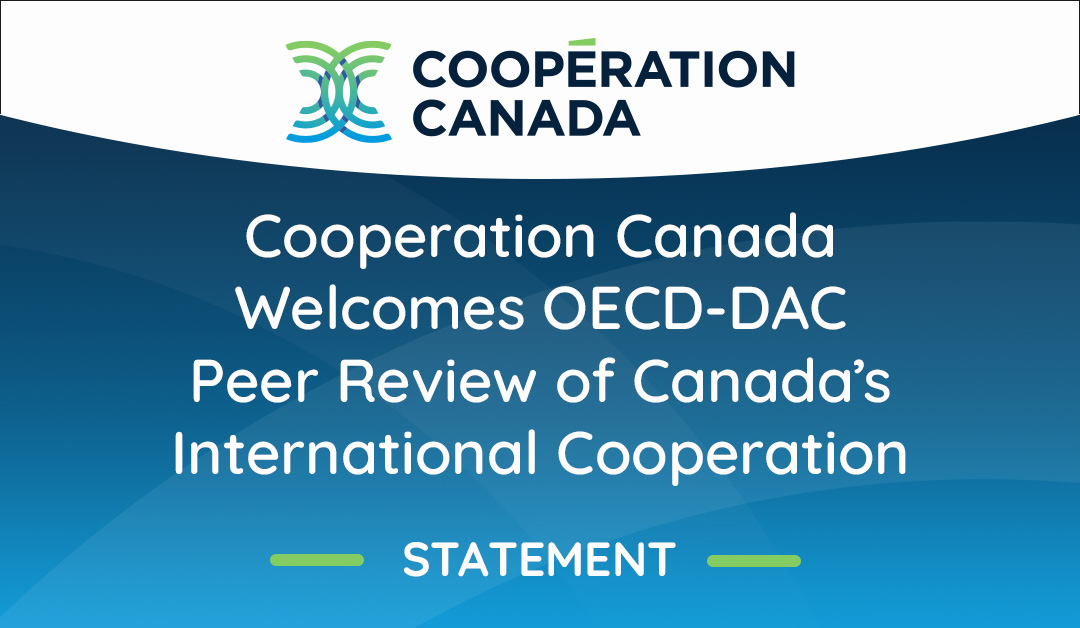
by Cooperation Canada | Jun 4, 2025 | Civil Society, News, Statement
Cooperation Canada welcomes the release of the 2025 OECD Development Assistance Committee (DAC) peer review of Canada. The review provides an important assessment of Canada’s progress in advancing effective, inclusive and coherent international cooperation.
We are encouraged to see that many of the review’s findings and recommendations align with priorities consistently raised by Canadian civil society. In particular, the report calls for better coordination across diplomacy, trade and development to ensure consistent priorities and more joined-up action; stronger support for locally led development through more direct funding, capacity sharing and meaningful inclusion of local actors; and more consistent, transparent engagement with civil society organizations, including through improved consultation practices and greater clarity on how feedback is used.
The report also emphasizes the need to strengthen public engagement and improve how results are communicated to Canadians, recommending that Canada enhance its narrative around the impact of international assistance and increase transparency on project performance.
This review is a timely opportunity to reflect on Canada’s global role and recommit to ambitious, principled leadership.
As the national coalition of international cooperation organizations, Cooperation Canada looks forward to working with Global Affairs Canada to:
- This review is a timely opportunity to reflect on Canada’s global role and recommit to ambitious, principled leadership.
- As the national coalition of international cooperation organizations, Cooperation Canada looks forward to working with Global Affairs Canada to:
- Act on key recommendations to enhance the effectiveness and quality of Canada’s international assistance
- Strengthen coordination across government and implement whole-of-society approaches to global engagement
- Improve transparency, predictability and accessibility in funding and partnerships
- Advance public engagement and better communicate the results and impact of Canada’s global efforts—working alongside our network of over 100 members across the country
“We appreciate the meaningful engagement of civil society throughout the peer review process and thank Global Affairs Canada and the OECD-DAC for their openness to dialogue,” said Shannon Kindornay, Deputy CEO of Cooperation Canada. “We look forward to working together to advance efforts to align Canada’s trade, diplomacy and development efforts, enable more locally led approaches and engage people in Canada on the impact of Canada’s strategic and principled investments in international cooperation.”
Notes to Editors
- Cooperation Canada is the national voice for Canadian international development and humanitarian organizations. Representing over 100 organizations, we convene, coordinate and advocate for effective, inclusive and accountable international cooperation that contributes to a fairer, safer and more sustainable world.
- The Organisation for Economic Cooperation and Development (OECD) Development Assistance Committee (DAC) conducts regular peer reviews of its member countries to assess the effectiveness, quality and impact of their international development cooperation. These reviews evaluate performance against DAC recommendations and international standards and provide guidance to improve future policies and practices. Peer reviews are conducted every five to six years.
- Cooperation Canada coordinated civil society engagement throughout the peer review process and provided input on priorities for Canadian development and humanitarian policy. Since 1968, Cooperation Canada has brought together civil society organizations working globally to build a fairer, safer and more sustainable world.
Media Contact
Gabriel Karasz-Perriau, Senior Communications Manager
[email protected]
(514) 945-0309
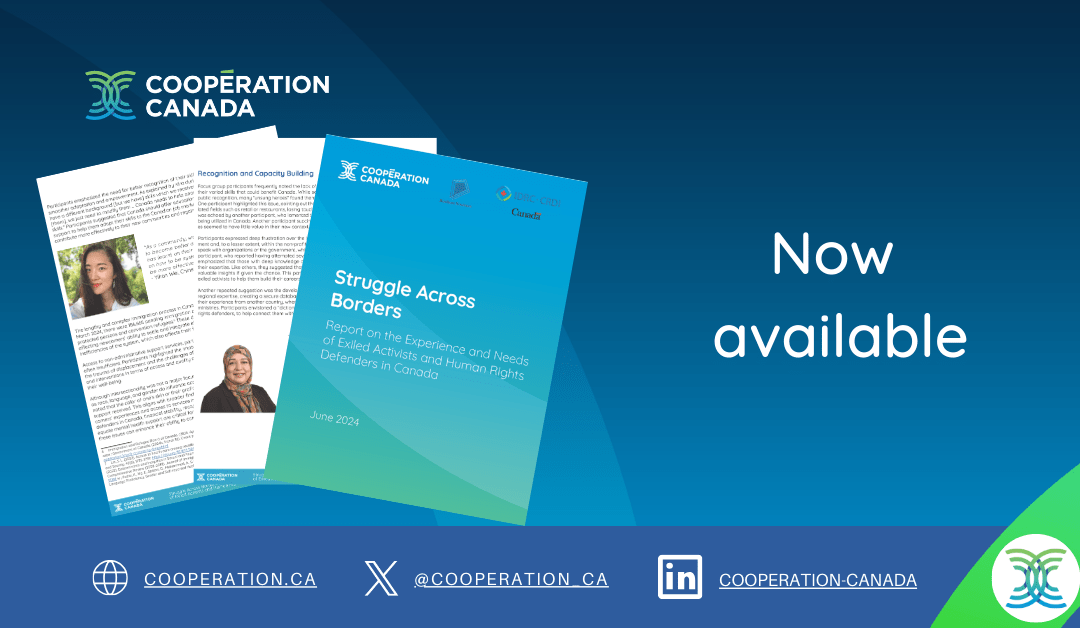
by Samantha Searle | Jun 25, 2024 | Civil Society, News, Publications, Resilient Societies
Cooperation Canada and Resilient Societies are proud to launch Struggle Across Borders, a report on the experience of exiled activists and human rights defenders in Canada.
Funded by the International Development Research Centre, this report is based on research conducted involving 27 civic space activists and human rights defenders from twelve countries.
This project uncovered significant insights about:
1. Adaptation and support systems in Canada
Participants highlighted the need for robust support systems to foster the resilience of exiled activists and human rights defenders in Canada. Collaboration with relevant government agencies was deemed essential to streamline immigration pathways and provide sustainable support.
2. Risks of activism and transnational repression
This research underscored the unique risks faced by exiled activists and human rights defenders, necessitating tailored training for public safety institutions and the development of clear policies to safeguard fundamental freedoms and human rights
3. Recognition and capacity building
Improved integration within Canadian institutions, targeted training programs, and enhanced networking opportunities emerged as crucial elements for empowering exiled activists and human rights defenders and promoting collaboration within the community.
-
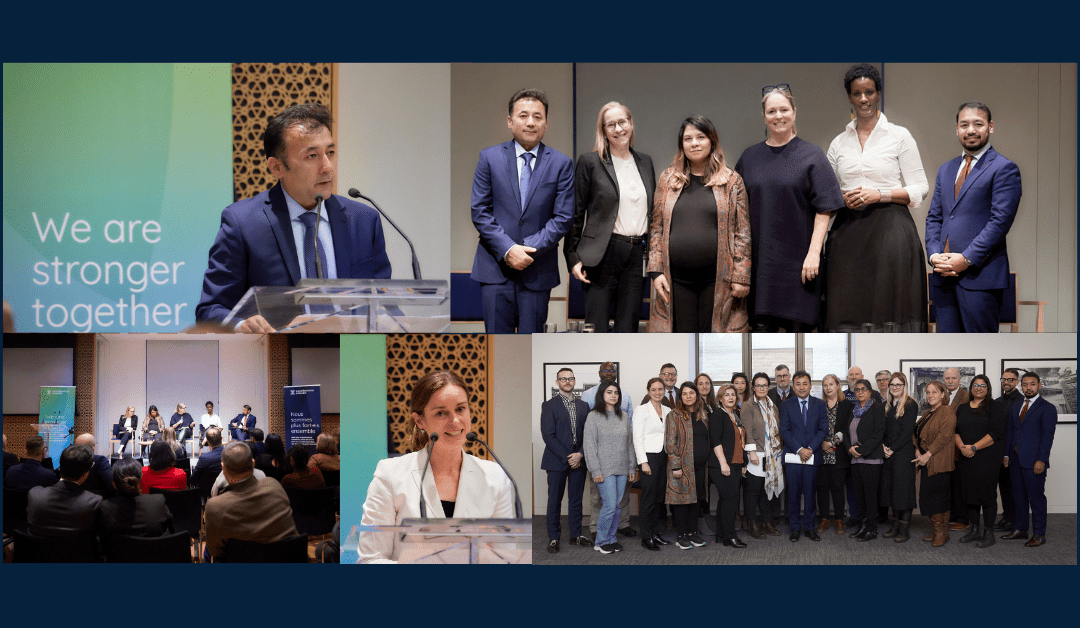
by Cooperation Canada | Dec 6, 2023 | Civil Society, News, Resilient Societies
On November 30th, 2023, a series of events marked the launch of Resilient Societies, an emerging hub for activists and human rights defenders in exile. With Resilient Societies currently being incubated at Cooperation Canada, a morning brainstorming session was held at its offices in Ottawa, bringing together exiled activists to discuss the challenges of shrinking civic space. Later in the day, activities were held at the Global Centre for Pluralism, hosting a cross-sectoral roundtable discussion and the official launch featuring leading voices from civil society and government.
Resilient Societies
Resilient Societies is an activist-led hub providing support and creating safe spaces for grassroots networks of human rights defenders and democracy and civil society activists to collaborate, innovate, and advocate in ‘closing’ and ‘closed’ civic spaces. Resilient Societies builds on Canada’s culture of embracing diversity and pluralism and its generosity in supporting and welcoming at-risk activists and translates it into organic, innovative, and activist-centred programs and projects with impacts in the diaspora and activists’ countries of origin. By building resilience, enhancing voice and agency, and raising the credibility and relevance of civil society activists and human rights defenders from closed and closing spaces, Resilient Societies contributes to reversing global democratic backsliding and shrinking civic spaces.
Launch Day Highlights
Activist Brainstorming Session
The morning brainstorming session, hosted by Cooperation Canada, assembled a group of exiled activists from Afghanistan, Hong Kong, Iran, Pakistan, Syria, and Ukraine. This was an opportunity for defenders of human rights and civic space to discuss the challenges of continuing their advocacy work whilst in exile. This included reflections on how communication technologies that previously facilitated linkages between exiled activists and those that remain in closing (or closed) civic spaces are increasingly co-opted by authoritarian regimes and the private sector, posing greater risks to activists and their socio-familial networks. Some argued that challenges related to status and acknowledgment were at play. They clarified that despite exiled activists typically receiving recognition for their efforts in their home country, they don’t enjoy the same esteem in Canada, which hampers their prospects of securing meaningful employment.
Cross-Sectoral Roundtable Discussion
In the early afternoon, activists were joined by members of civil society, government, and academia for a cross-sectoral discussion hosted by the Global Centre for Pluralism. The discussion was divided into two sessions. The first session, Shrinking Civic Spaces: Understanding the Context, presented an opportunity for activists and human rights defenders to share their experiences and perspectives with roundtable participants. Key points included the increasing extent of transnational repression and the unique vulnerability of certain groups engaged in civic space activism, notably women, racialized persons, and LGBTQI+. The second session, Reclaiming Civic Space: The Way Forward, opened the discussion towards a future-forward dimension. Participants across sectors raised the need to become more organized and coordinated in the defence of human rights, and that such rights are not segregated and shouldn’t be considered an ‘à la carte menu.’ Notably, there was broad agreement that Canada is not sheltered from the global trend of shrinking civic space, and that leveraging the insight and lived experience of activists in exile would be beneficial to current and future efforts towards the protection of democratic values and institutions.
Launch Event
The main launch event, again hosted by the Global Centre for Pluralism, was attended by leading representatives from civil society, academia, and government. Kicking off the event was Meredith Preston McGhie, Secretary General at the Global Centre for Pluralism, highlighting the importance of supporting efforts towards the preservation and protection of civic space. For the keynote address, Anita Vandenbeld, Parliamentary Secretary to the Minister of International Development, provided sobering words on the erosion of democracy worldwide. The message was clear: Defending democracy is urgently needed, and Canada stands to gain by being at the forefront of these efforts. This was followed by words shared by Kate Higgins, CEO at Cooperation Canada, reaffirming its commitment to playing a convening role in the field of international cooperation, and to incubating the important work of Resilient Societies. Maiwand Rahyab, a civic space expert from Afghanistan and founder and CEO of Resilient Societies, then outlined his vision for this initiative, positioning the unique role activists play in holding to account the global phenomena of shrinking civic space. The format then shifted to a panel discussion moderated by Sayed Madadi, esteemed activist-in-exile, non-resident Fellow at the Middle East Institute in Washington, and editor at KabulNow. The panel comprised of Muzna Dureid, a leading human rights activist from Syria, Ketty Nivyabandi, Secretary General of Amnesty International Canada, Julie Delahanty, President of the International Development Research Centre, and Tara Denham, Director-General of Human Rights, Freedoms and Inclusion at Global Affairs Canada. The event was closed by Chris Eaton, Executive Director of World University Service of Canada, providing inspiring words of encouragement, underlining that initiatives such as Resilient Societies are deserving of attention and resources.
Cooperation Canada would like to recognize The Global Centre for Pluralism and World University Service of Canada for their generous contributions towards the launch event, and the International Development Research Centre for their initial funding contribution to Resilient Societies.
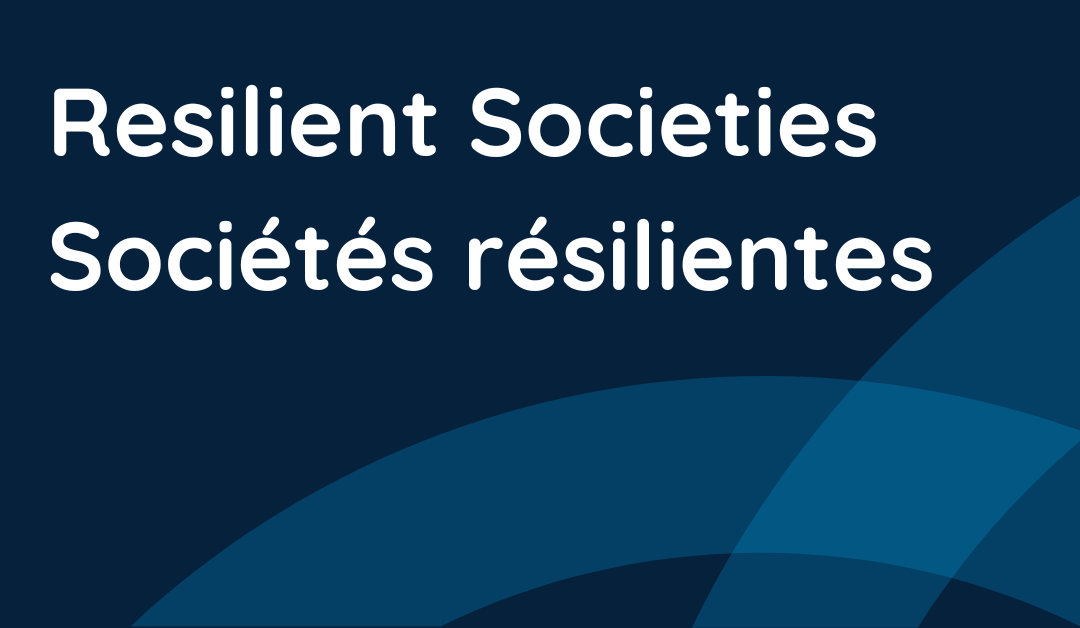
by Cooperation Canada | Nov 29, 2023 | Civil Society, News, Press Release, Resilient Societies
November 29, 2023, Ottawa – At a time when human rights and democracy are under threat in many parts of the world, Cooperation Canada is proud to participate in the launch of Resilient Societies, a new activist-led hub that provides support and creates spaces for human rights and democracy defenders, civil society activists and practitioners worldwide to unite, innovate and advocate. The launch will take place on November 30, 2023, at the Global Centre for Pluralism in Ottawa.
The launch event will raise awareness of the challenges and opportunities facing human rights defenders and civil society activists in countries with closed and repressive civic spaces, highlight strategic opportunities for collaboration and engagement between diaspora activists from closed and repressive spaces now based in Canada with others around the world, and present the vision, ambitions and priorities of Resilient Societies.
The launch will bring together leading figures in the field of human rights and democracy, including Maiwand Rahyab, a civic space expert from Afghanistan and the founder and CEO of Resilient Societies, and Muzna Dureid, a leading human rights activist from Syria. They are both now based in Canada.
“By fostering the resilience, agency and collaboration of democracy and human rights activists from closed and repressive spaces, including those now based in Canada, Resilient Societies ultimately seeks to contribute to creating open, resilient and vibrant civic spaces free of fear and repression”, said Maiwand Rahyab, Resilient Societies’ Founder and CEO.
Other guest speakers at the launch include Anita Vandenbeld, Parliamentary Secretary to the Minister of International Development, Ketty Nivyabandi, Secretary General of Amnesty International Canada, Meredith Preston McGhie, Secretary General at the Global Centre for Pluralism, Julie Delahanty, President of the International Development Research Centre, Tara Denham, Director-General of Human Rights, Freedoms and Inclusion at Global Affairs Canada, Chris Eaton, Executive Director of World University Service of Canada, and Kate Higgins, CEO at Cooperation Canada.
“At a time when human rights and civic space are threatened in so many parts of the world, Cooperation Canada is humbled to be playing a small role in the launch of this ambitious initiative”, said Kate Higgins, CEO of Cooperation Canada. “As a coalition of civil society organizations, we believe in the importance of supporting human rights, civic space and democracy, and are excited to support the important work of courageous activists in Canada and around the world”.
About Resilient Societies
Resilient Societies (RS) is an activist-led hub providing support and creating spaces for grassroots networks of human rights defenders and democracy and civil society activists and practitioners to unite, innovate, and advocate to address closing civic space. RS builds on Canada’s culture of embracing diversity and pluralism and its generosity in supporting and welcoming at-risk activists and translates it into organic, innovative, and activist-centered programs and projects that supports the work of activists-in-exile, and activists in repressed civic spaces. By building resilience, enhancing voice and agency, and raising the credibility and relevance of civil society activists and human rights defenders from closed and closing spaces, RS contributes to reversing the backsliding of democracy and shrinking civic space.
Resilient Societies is hosted by Cooperation Canada for its incubation period.
About Cooperation Canada
Cooperation Canada brings together Canada’s international development and humanitarian organizations and advocates for them by convening sector leaders, influencing policy and building capacity. Together, we work with partners both inside and outside Canada to build a world that’s fair, safe and sustainable for all.
Press contact
Gabriel Karasz-Perriau
Communications Manager
Cooperation Canada
(514) 945-0309
[email protected]

by Cooperation Canada | Sep 1, 2023 | Civil Society, News
From July 31st to August 1st, the Civil Society Pillar (CSP) of the Community of Democracies (CoD) held its annual meeting in Panama City. The CoD is is an intergovernmental coalition committed to advance and protect democratic freedoms, strengthen democratic institutions, and expand political participation. As CSP national focal point, Cooperation Canada joined representatives from fourteen other countries to discuss the strategic vision of the CoD in light of ongoing threats on civic space and democratic institutions worldwide.
While the CSP is not a voting member of the CoD, it has historically endeavoured to represent the interests of civil society within the organization. For instance, the CSP voiced its disappointment over the renewal of Hungary’s membership to the Governing Council (GC) despite concerns about its non-compliance with the Warsaw Declaration, the founding document of the CoD. This conversation remains open within the CSP, where a strong Latin American presence in Panama City led to important discussions on the membership legitimacy of Argentina, El Salvador, and Guatemala.
In light of the worrying state of democracy, CSP representatives agreed that the GC fell short of achieving goals set out in its 2018-2023 Strategic Plan. While the plan committed to responding to democratic backsliding and the restriction of civic space, reforming GC processes, and expanding partnerships, the CSP emphasized that most efforts were centered on dialogue. Looking to the drafting of the of the forthcoming 5-year plan, to be released in 2024, the Pillar emphasized that proactive measures and actions must take greater focus.
The global trend towards democratic backsliding was a key area of concern to all civil society representatives. Within the civil society space, representatives agreed that the erosion of civil liberties, threats to freedom of expression, and weakening of rule of law have made their work more challenging and dangerous. A key observation was that authoritarian leaders and groups often gain power through democratic processes, only to shut down civic participation spaces once power has been consolidated.
The CoD has been chaired by Canada since 2022, with the country represented by the Minister of Foreign Affairs. There is no certainty as to whether Canada will renew its term as CoD President. We encourage the Government of Canada to consider the CSP recommendations , namely 1, 2, 3 and 7. Cooperation Canada deems the drafting of a new strategic plan a crucial moment for Canada to voice its commitment to human rights and demonstrate its global leadership on the matter. Canadian CSOs, including those participating in the upcoming Universal Periodic Review of Canada led by the UN Human Rights Council, stand as active allies and agents of change.






